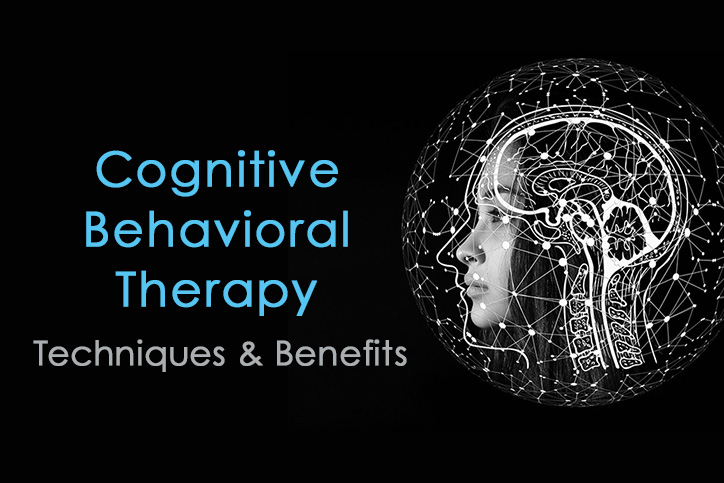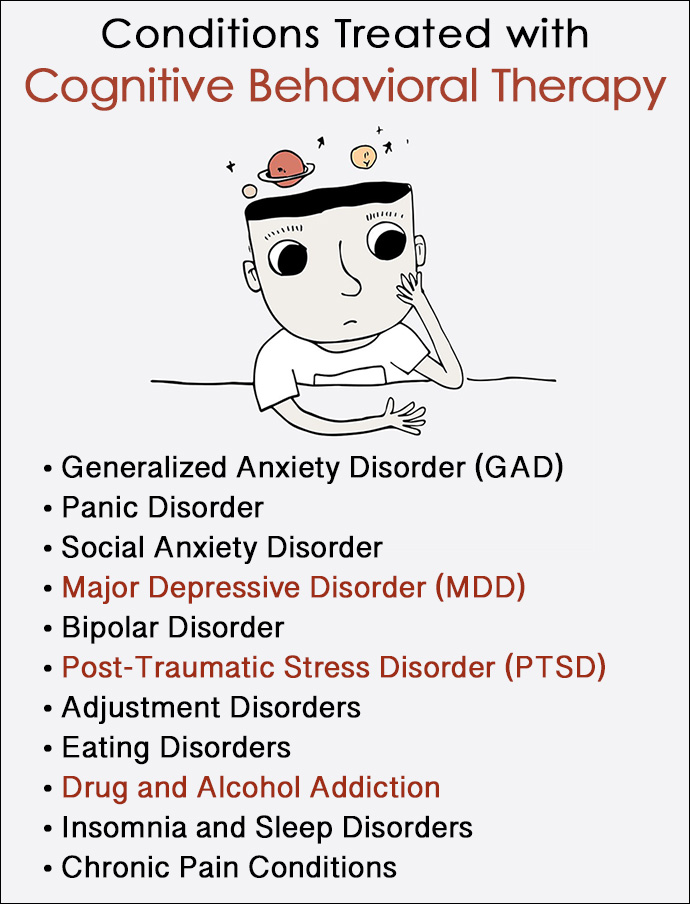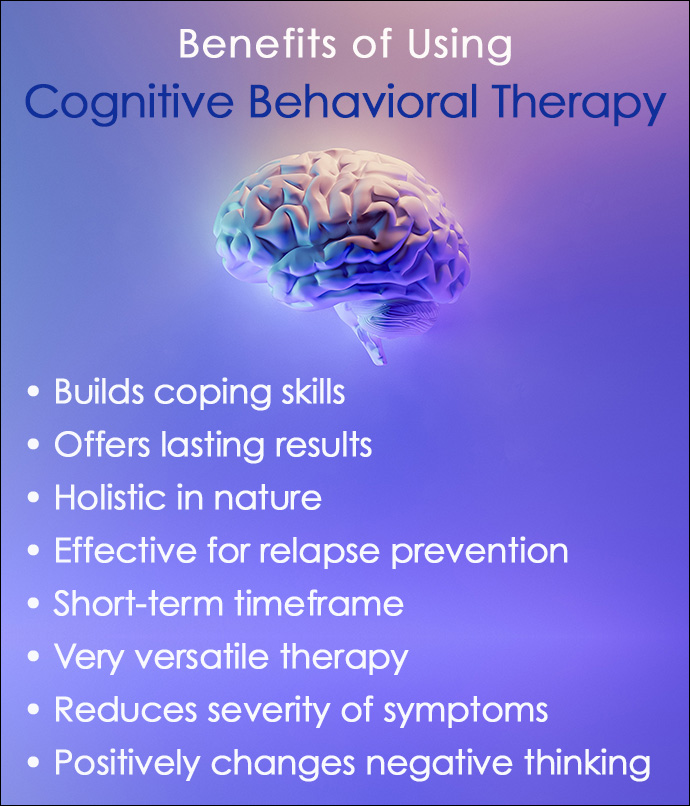Table of Contents
Cognitive Behavioral Therapy techniques and CBT skills offer practical tools and strategies for overcoming a wide range mental health issues and substance use addiction.
Stress, anxiety, and trauma are common for many people, and if left untreated, they can lead to more serious issues that may spiral out of control.
Cognitive Behavioral Therapy techniques and CBT skills tools are designed to address and modify negative thought patterns to provide lasting mental wellness.
Cognitive Behavioral Therapy Fundamentals
Cognitive Behavioral Therapy (CBT) is an evidence-based, goal-oriented psychotherapy that identifies and addresses the connection between a person’s thoughts, feelings, emotions, and behaviors.
It is a form of talk therapy that is based on the premise that our thoughts, feelings, and behaviors are all connected.
CBT was developed by Dr. Aaron Beck in the 1960s as an approach to mainly treat depression. Today it is one of the most widely used treatment modalities around the world for managing a variety of mental health conditions.
Cognitive Behavioral Therapy techniques empower individuals to have a better understanding of their thought processes, change dysfunctional behaviors, and develop CBT skills and coping strategies to improve mental well-being.
Core Principles of CBT
1. Evidence-Based
Cognitive Behavioral Therapy is supported by a substantial body of research and is considered an evidence based treatment that is effective for use with many types of mental health conditions including addiction.
2. Collaborative and Structured
CBT is a collaborative therapy between a therapist and the client patient that follows a structured format to identify specific goals and practical strategies to achieve them.
3. Time-limited
CBT is typically a short-term therapy that encourages a focused approach to setting and achieving the patient’s goals and objectives.
3. Focused on the Present
While past experiences or ruminating thoughts may have an impact on a person’s thinking, one of the goals of CBT is to focus on the present moment.
This helps individuals understand how their current thoughts and behaviors contribute to emotional challenges and offers ways to deal with them in the here and now.
4. Cognitive Restructuring
CBT Therapy helps individuals become aware of their automatic negative thoughts and uses cognitive restructuring to learn how to challenge and replace unrealistic thoughts with more realistic ones.
5. Behavioral Modification
Behavioral Modification focuses on behaviors linked to emotional distress and uses strategies to change the negative behaviors and promote positive and healthier actions.
6. Skill-Building
CBT skills build positive coping techniques that individuals can use for relaxation, problem-solving, and reducing stress.
7. Versatile
CBT techniques are very versatile and effective for many mental health issues, including different types of depression, anxiety, trauma, eating disorders, drug and alcohol addiction, and many others.
Conditions Treated with Cognitive Behavioral Therapy Techniques
Because of its versatility, CBT Therapy is recommended for many types of mental health conditions and substance use disorders.
CBT skills are effective for treating the following conditions:
- Generalized Anxiety Disorder (GAD)
- Panic Disorder
- Social Anxiety Disorder
- Major Depressive Disorder (MDD)
- Bipolar Disorder
- Post-Traumatic Stress Disorder (PTSD)
- Adjustment Disorders
- Eating Disorders
- Drug and Alcohol Addiction
- Insomnia and Sleep Disorders
- Chronic Pain Conditions
CBT Skills and Benefits
There are many CBT benefits for individuals struggling with mental health challenges and substance use disorders.
It is one of the most extensively researched forms of evidence-based psychotherapy and works well with other treatment modalities to provide a comprehensive method of achieving mental-wellness.
The Benefits of CBT Skills Include:
1. Builds coping skills
CBT techniques equip individuals with practical coping skills and tools to independently overcome negative thoughts, emotions, and behaviors. It teaches healthy ways of coping with stress and negative emotions to improve resilience and overall well-being.
2. Offers lasting results
Individuals can continue to use CBT skills and techniques in daily life long after treatment sessions with a therapist have concluded.
3. Holistic in nature
Cognitive Behavioral Therapy uses a holistic approach to healing by addressing the connection between a person’s thoughts, emotions, and behavior, and contributes to a better understanding of their overall mental health.
4. Effective for relapse prevention
CBT provides individuals with the tools for recognizing potential triggers or warning signs and teaches strategies for managing relapse prevention. This makes it an effective therapy for preventing the recurrence of symptoms in the future.
5. Short-term timeframe
CBT is often a short-term therapy that is goal-oriented, with a focus on achieving specific objectives and outcomes in a relatively brief period.
6. Very versatile
Cognitive Behavioral Therapy is ideal for a variety of mental health conditions, and because many of them overlap with each other, it can used for more than one condition.
It can be adapted for depression, anxiety disorders, phobias, OCD, eating disorders, and substance use disorders and addiction.
CBT is even more powerful when combined with other therapies or pharmacological interventions like anxiety medications or antidepressants.
7. Reduces severity of symptoms
Many patients notice the severity of symptoms associated with their mental health condition is reduced in a fairly short time, which makes it easier to move forward in recovery.
Reducing the severity of symptoms accelerates improvements in mood, stress, anxiety, and overall mental functioning.
8. Positively changes negative thinking
Identifying and modifying negative thought patterns leads to healthier and more realistic thinking, which has a positive impact on emotions, behaviors, and healing.
Cognitive Behavioral Therapy techniques provide individuals with practical tools to understand the causes and reasons for their mental health challenges. CBT skills offer effective strategies that lead to positive changes with lasting results.
Cognitive Behavioral Therapy Techniques
There are many different types of Cognitive Behavioral Therapy techniques and strategies that can be applied to various conditions or challenges.
Examples of Cognitive Behavioral Therapy Techniques
1. CBT Cognitive Restructuring Techniques
With CBT cognitive restructuring techniques, clients learn to identify and recognize distorted or negative thought patterns. The role of the therapist is to guide individuals to challenge irrational thoughts and replace them with healthier and more realistic ones.
2. Behavioral Activation
Behavioral activation encourages clients to engage in positive and fulfilling activities to correct or neutralize unhealthy thoughts and behaviors. Gradual exposure targets avoidance behaviors by consciously confronting problematic situations.
3. Mindfulness and Relaxation Techniques
Mindful breathing is a CBT technique that teaches individuals to focus on their breath in the present moment. It is useful for reducing stress, anxiety, and improves focus and attention.
4. Journaling
Journaling allows individuals to record negative thoughts and emotions, as well as positive, healthier ones.
Similar to a Gratitude Jar, keeping a Gratitude Journal is a way to express being grateful and appreciate positive daily experiences.
5. Role-Playing
Social skills training is a method to help individuals develop and enhance their own interpersonal skills through role-playing scenarios and acting out different situations to reframe automatic negative thoughts.
Types of Cognitive Behavioral Therapy
Cognitive Behavioral Therapy is a versatile treatment method, and distinct types of cognitive therapy have been developed to address specific mental health issues and conditions.
Here are some common types of Cognitive Therapy
Dialectical Behavior Therapy (DBT)
Dialectical Behavior Therapy was originally developed for treating borderline personality disorder. It has broadened its scope as a complement to CBT Therapy by integrating DBT techniques like acceptance and mindfulness.
Cognitive Processing Therapy (CPT)
Cognitive Processing Therapy is a specific type of cognitive therapy designed for treating post-traumatic stress disorder (PTSD). It combines cognitive restructuring with exposure techniques to help individuals address negative beliefs related to traumatic experiences.
Mindfulness-Based Cognitive Therapy (MBCT)
Mindfulness-Based Cognitive Therapy combines mindfulness practices with CBT techniques to prevent the relapse of depression by teaching people how to become more aware of their thoughts and feelings without judging them.
Acceptance and Commitment Therapy (ACT)
Acceptance and Commitment Therapy focuses on accepting negative thoughts and feelings instead of trying to change or eliminate them. It encourages individuals to commit to behaviors and actions that align with their values.
Exposure and Response Prevention (ERP)
Exposure and Response Prevention is a specialized type of cognitive therapy for treating obsessive-compulsive disorder (OCD) and helps individuals break the cycle of obsessions and compulsions.
Trauma-Focused Cognitive Behavioral Therapy (TF-CBT)
Trauma-Focused Cognitive Behavioral Therapy combines cognitive behavioral therapy techniques with trauma-focused interventions to address the impact of traumatic events experienced by children and adolescents.
Cognitive Behavioral Analysis System of Psychotherapy (CBASP)
CBASP was developed as a type of cognitive therapy for addressing interpersonal challenges faced by individuals with chronic or persistent depression.
Brief Cognitive Behavioral Therapy (BCBT)
Brief Cognitive Behavioral Therapy is a condensed form of CBT that focuses on specific, targeted goals in a shorter timeframe than usual, while still offering the most important benefits of CBT.
These types of CBT therapy demonstrate the adaptability of this therapeutic approach for treating specific mental health conditions.
The Cognitive Behavioral Therapy skills and techniques outlined here demonstrate how versatile this evidence-based approach can be for treating mental health issues and addiction.
CBT techniques offer the tools and strategies to identify and address a person’s negative thoughts, feelings, emotions, and behaviors, and improve overall mental health and well-being.
Frequently Asked Questions
How effective is cognitive behavioral therapy?
Cognitive Behavioral Therapy is considered a highly effective method for treating addiction and many mental health conditions.
It is an evidence-based therapy backed by hundreds of clinical studies that have shown long-term, sustained benefits, especially when compared to other therapies.
CBT is also considered to be safer and more effective than medications when used for long periods.
Why are cognitive behavioral therapy techniques effective?
Cognitive Behavioral Therapy techniques are effective because they directly address negative thoughts and behavior patterns that drive addiction and mental health issues.
CBT skills empower individuals to use practical tools to change unhealthy thinking by targeting the root causes instead of simply addressing the symptoms.
By identifying and challenging negative patterns with healthier thoughts and behaviors, CBT offers lasting change to improve the way individuals think, feel, and act.
What are the most effective CBT techniques for anxiety?
Some of the most effective CBT techniques for anxiety include cognitive restructuring, exposure therapy, mindfulness, and journaling.
Cognitive Restructuring identifies and challenges negative thoughts that lead to anxiety.
Exposure Therapy helps individuals directly face their fears in a safe and supportive manner to become less anxious and stop avoiding situations that scare them.
Mindfulness combines relaxation and breathing techniques with being present in the current moment instead of thinking about the past or future.
Journaling is a useful way to keep track of negative thoughts, emotions, and triggers, as well as positive ones. Identifying patterns makes it easier to avoid unhealthy ones in the future and focus on positive ones.
What are CBT techniques for alcohol abuse?
CBT techniques for alcohol abuse are designed to change negative thoughts and behaviors associated with drinking.
Coping skills training and relapse prevention planning focus on recognizing triggers and avoiding risky situations to maintain sobriety.
Coping Skills Training teaches ways to overcome pressure pressure, stress, or anxiety that may cause an individual to use alcohol to cope with the distress.
Relapse Prevention Planning is useful for managing triggers, cravings, and unhealthy environments by using strategies to resist drinking and stay sober.
Is grounding a CBT technique?
Yes, grounding is one of the CBT techniques used for anxiety, stress, and trauma. It is beneficial for disrupting emotional distress and redirecting negative thought patterns to the present moment.
The 54321 Grounding Technique is commonly used in CBT training to regulate thoughts and emotions.





